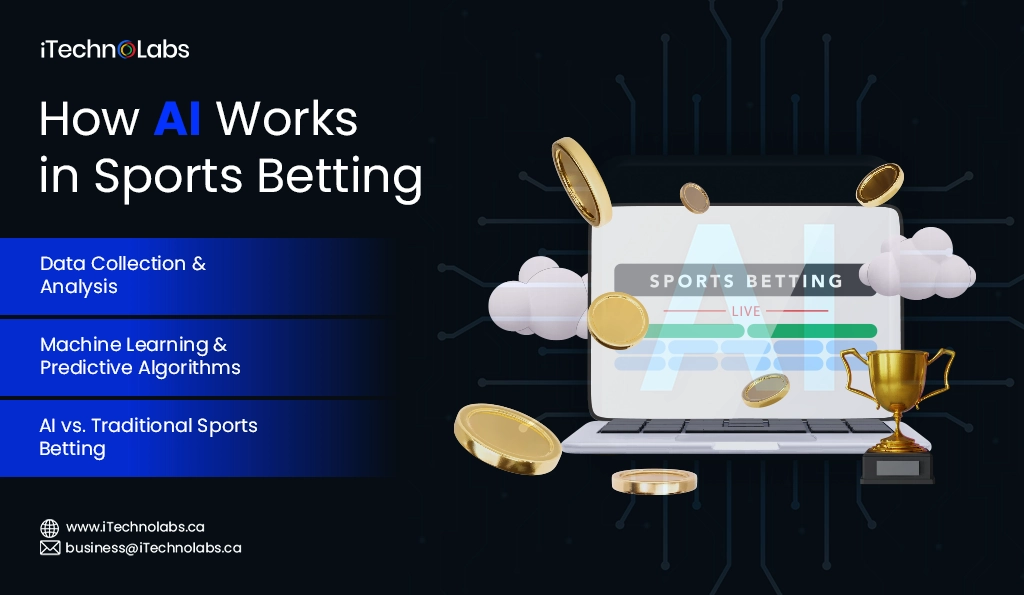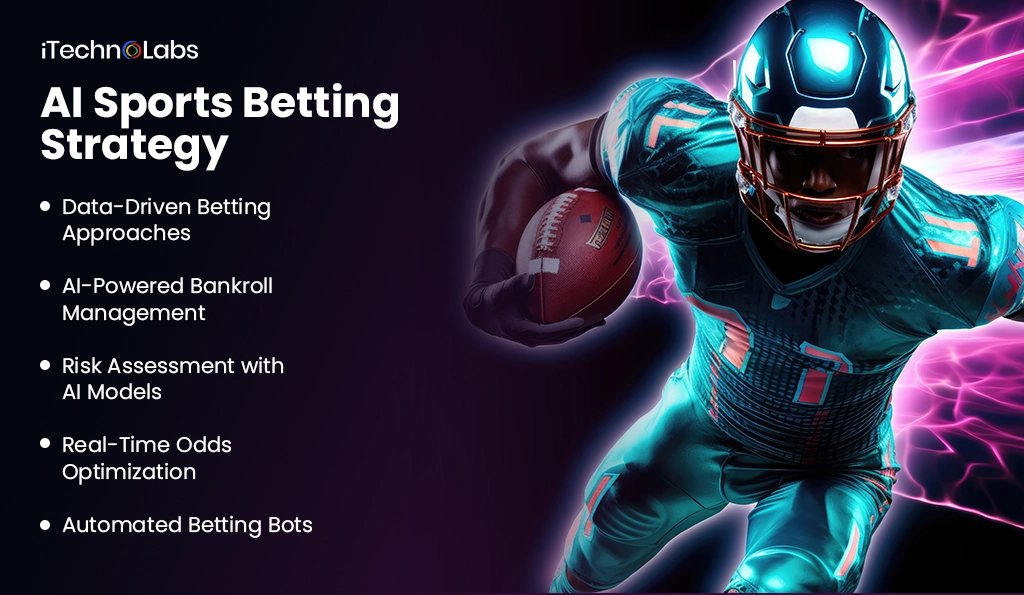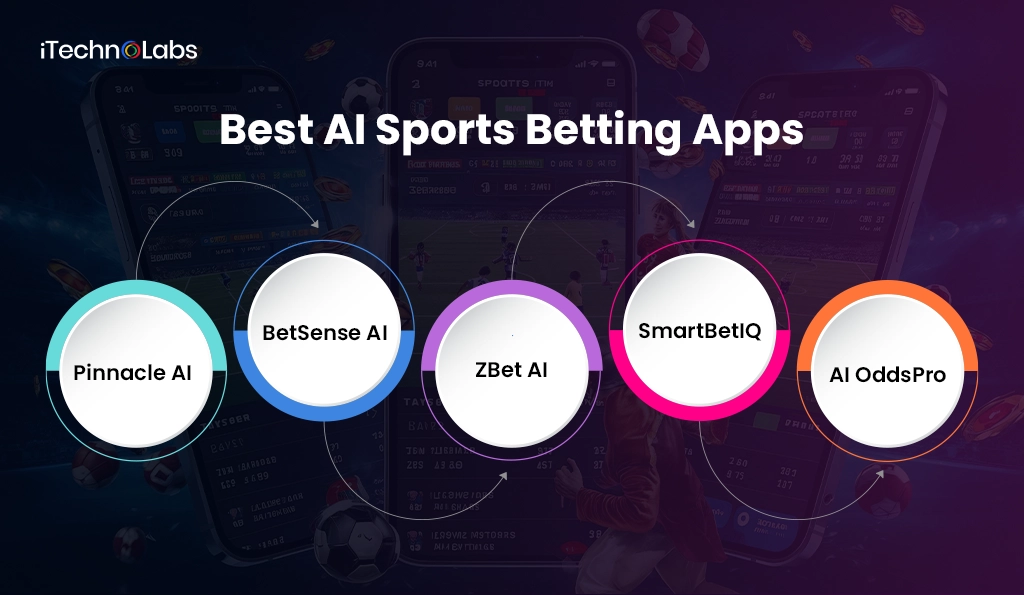Sports betting has ever been a game of gut, pundits, and luck—but suppose you could have more accurate foresight? AI sports betting is changing the sport by scanning gigantic amounts of data, identifying invisible patterns, and generating data-backed forecasts in real-time.
From match results forecasts to bet optimization, AI does away with uncertainty and provides an advantage for bettors. Whether you’re a recreational bettor or a high-roller, AI-based models can assist you in placing better, quicker, and more lucrative bets. Are you ready to see how AI is transforming sports betting? Let’s get started!
Market Stats: AI Usage in Sports Betting
- Market Growth: According to Statista, the global sports betting market is projected to reach US$77.87 billion by 2026, with an expected annual growth rate (CAGR) of 5.09% from 2026 to 2029.
- AI in Sports Market: As per Mordor Intelligence, the AI market in sports is anticipated to grow from USD 7.63 billion in 2026 to USD 26.94 billion by 2030, reflecting a CAGR of over 28.69%.
- Virtual Sports Betting: This segment is expected to surge, with projections indicating it will reach USD 110.5 billion by 2034, up from USD 14.4 billion in 2024, as per Market.us Scoop, at a CAGR of 22.60%.
AI’s influence is evident in various aspects of sports betting, from enhancing predictive analytics to personalizing user experiences. As the industry evolves, AI-driven tools are becoming indispensable for operators aiming to stay competitive and offer innovative solutions to bettors.
How AI Works in Sports Betting
-
Data Collection & Analysis
AI sports betting is based on massive amounts of real-time and historical data such as player statistics, team performances, weather, and the odds of betting. AI algorithms collect and process this data from various sources, determining trends and patterns that a human bettor may fail to notice.
-
Machine Learning & Predictive Algorithms
Machine learning algorithms analyze this information to make probability-based predictions. Through constant learning from previous results, AI improves its accuracy, enhancing odds calculation, risk management, and betting strategy. Sophisticated models can identify subtle, game-altering factors that affect outcomes.
-
AI vs. Traditional Sports Betting
Unlike regular sports wagering, depending on gut and professional opinion, AI eliminates human bias and feelings. It has data-driven decisions that recommend the most profitable wagers, real-time odds adjustment, and even imitate possible game scenarios. Through this, AI betting is quick, precise, and efficient and provides bettors with an edge over the traditional approach.
AI Sports Betting Predictions:
AI is revolutionizing the process of sports betting with enhanced prediction efficiency, optimized odds, and minimal risks. The following are some ways AI-based sports betting forecasts are changing the future:
-
Role of AI in Predicting Match Outcomes
AI sports betting models make use of humongous databases, such as player performance, team stats, injury reports, and even meteorological conditions, to forecast match outcomes. Using hidden patterns and correlations that it discovers, AI offers data-driven forecasts that increase the odds of making accurate bets over the conventional analysis.
-
AI-Driven Odds Calculation
Bookies and online gambling sites employ AI to determine real-time odds based on analyzing market movements, betting volumes, and past statistics. AI assists in changing odds dynamically with live game progress, providing more accurate betting lines that approximate genuine chances.
-
Machine Learning & Historical Data Analysis
AI betting models learn from historical betting outcomes, updating their models to identify patterns that affect results. Machine learning algorithms identify game-altering variables, including team form, tactical changes, or referee bias, resulting in more precise betting tips.
-
Accuracy of AI Betting Predictions
AI can achieve high accuracy in predictions, sometimes exceeding 70-80% in specific sports with well-documented data (e.g., football, basketball). However, sports remain unpredictable due to unexpected events like injuries, referee decisions, or last-minute changes, limiting AI’s effectiveness in every scenario.
-
Limitations & Ethical Considerations
Though efficient, there are limitations with AI sports betting, such as data biases, excessive dependence on past trends, and uncontrollable game variables. In addition to that, concerns about ethics involved in detecting match-fixing, along with playing responsibly, warrant AI to operate within regulatory regulations responsibly.
AI Sports Betting Strategy
Artificial intelligence (AI) in sports betting is transforming the way bettors formulate and implement strategies. AI sports betting strategy targets data analysis, risk management, and automation for maximizing betting decision-making and profitability. Here’s how AI refines betting strategies:
-
Data-Driven Betting Approaches
Conventional sports betting tends to be based on gut feelings, pundits’ predictions, and history. AI is different, using a data-based approach to look at huge amounts of structured and unstructured data from various sources. By running team performance, player statistics, historical match results, injury news, and even social media sentiment through its systems, AI algorithms can spot patterns and correlations that may elude human punters. These predictions enable punters to make higher-probability bets with increased confidence.
-
AI-Powered Bankroll Management
Effective bankroll management is one of the greatest challenges of sports betting. AI-based bankroll management systems review a bettor’s history of bets, risk appetite, and profit objectives to suggest optimal bet sizes. Machine learning models dynamically adjust the stakes of bets in real time based on odds, market direction, and betting patterns to maximize returns and limit losses. AI prevents bettors from making rash and emotional betting decisions.
-
Risk Assessment with AI Models
Risk assessment is a necessary component of any successful AI sports betting strategy. AI models use advanced statistical techniques, including probabilistic models and Monte Carlo simulations, to calculate the probabilities of certain outcomes. Predictions are made not only for match results but also for the expected values of bets, guiding the bettor to an assessment of whether a specific wager has a risk worth taking. AI can also identify overpriced and underpriced odds in the market that give an edge to the bettors over bookmakers.
-
Real-Time Odds Optimization
Odds are variable and can be dynamically adjusted in nature based on team news, injuries, market trends, and happenings during the live event. AI invests lots of resources in continuously monitoring the odds in real-time on multiple sportsbooks and identifying discrepancies and inefficiencies that bettors can capitalize on. AI-driven algorithms could also indicate the most opportune time to place bets by analyzing market movements, such as predicting changes in odds. This could give an edge to bettors in picking value bets and improving long-term profitability.
-
Automated Betting Bots
The advent of AI-powered betting bots is a game-changer in sports betting. Betting bots are computer programs designed to analyze data, track odds, and place bets automatically based on predefined algorithms and risk parameters. Unlike human bettors, AI bots operate round-the-clock, analyze a mass of information in the blink of an eye, and execute trades in a mechanical, unemotional way. Automated betting systems work especially well in arbitrage betting, allowing bettors to lock up a guaranteed profit based on small changes in odds across various sportsbooks.
With the strategic use of AI sports betting, bettors can edge ahead of the pack, become more accurate, and overcome the other risk-taking betting stakeholders throughout the betting industry.
Best AI Sports Betting Apps
| App Name | USP | User Ratings |
| BetSmartAI | – 80% accuracy in match outcome predictions
– Real-time odds comparison from 100+ sportsbooks – Identifies positive expected value (EV) bets |
4.8/5 |
| BetSense | – AI-powered personalized betting recommendations
– Enhances user engagement through tailored betting offers – Integrates seamlessly with sportsbook platforms |
4.5/5 |
| AiOdds | – AI-driven sports odds data APIs for operators
– Covers 50+ countries with real-time betting data – Offers trading solutions and engagement tools |
4.4/5 |
| SmartBettor | – Uses AI for pattern analysis and predictive modeling
– Identifies profitable betting opportunities – Leverages statistical and machine learning expertise |
4.6/5 |
| Pinnacle | – AI-based risk management and odds optimization
– Competitive odds with advanced betting strategies – Industry leader in data-driven sports betting |
4.7/5 |
Artificial intelligence is revolutionizing the sports betting industry by providing bettors with data-driven insights and personalized experiences. Here are some of the top AI-powered sports betting apps:
BetSmartAI
- Founded: 2026
- Founded By: A team of PhD mathematicians, data scientists, and MIT graduates
BetSmartAI uses cutting-edge machine learning algorithms to provide extremely accurate match result predictions with an 80% accuracy rate in top North American sports leagues. BetSmartAI provides live odds comparison across more than 100 sportsbooks, allowing users to spot the best value wagers. BetSmartAI also detects positive expected value (EV) bets, allowing users to make informed betting choices.
BetSense
- Founded: 2023
- Founded By: SharpLink Gaming
BetSense is a personalization and recommendation AI engine that is set to transform user interaction in sports betting. Through an individual’s better preferences and interests, BetSense personalizes betting offers and content, optimizing the overall user experience. In testing with SaharaBets, BetSense will blend into current sportsbook platforms to offer customized interactions.
AiOdds
- Founded: 2024
- Founded By: A global team of technology and sports enthusiasts
AiOdds is committed to delivering premium yet cost-effective sports odds data APIs for operators through the use of digital and AI technology. Based in more than 50 countries, AiOdds delivers full odds services, trading solutions, and betting engagement tools. AiOdds aims to enable the sports market with data, creating a rich platform for operators and punters alike.
SmartBettor
- Founded: 2026
- Founded By: Experts in statistics, mathematics, and machine learning
SmartBettor works to transform the world of sports betting using artificial intelligence technology. Their sophisticated algorithms scan patterns and trends to seek out profitable positive expected value wagering opportunities. Using knowledge in statistics and machine learning, SmartBettor works to exceed the capabilities of conventional betting platforms, giving bettors a valuable advantage in their betting endeavors.
Pinnacle
- Founded: 1998
- Founded By: Not publicly disclosed
Pinnacle is a renowned online sports betting and casino platform that has integrated AI for risk management and odds optimization. By utilizing AI technologies, Pinnacle enhances its betting offerings, providing users with competitive odds and a comprehensive betting experience.
These AI-driven platforms are at the forefront of transforming the sports betting landscape, offering users enhanced accuracy, personalized experiences, and innovative tools to make informed betting decisions.
Ethical & Legal Considerations in AI Sports Betting
With increasing AI use in sports betting, there are ethical and legal issues involved that need stringent regulation and careful gambling practices. Here’s the way AI is being regulated and its effect on fair play.
-
Regulations on AI in Betting
Whatever the level of sports betting, it is highly regulated traditionally, with AI caught in a framework of specific regulations that keep on evolving. Regulations are being made out by government and regulatory bodies like the UK Gambling Commission (UKGC), Malta Gaming Authority (MGA), and US gambling control boards to keep AI-based betting transparent and fair. The main issues are data privacy, algorithms that introduce bias, and preventing AI from exploiting vulnerabilities in betting markets. A few jurisdictions have limited the use of automated betting bots so that human judgments remain at the heart of gambling.
-
Fair Play & Responsible Gambling
Whereas AI improves gambling strategies, it also creates moral issues. With the potential for AI to guess outcomes very accurately, it has the risk of giving a form of unfair privilege to some players, and the potential for manipulating the market follows. Furthermore, AI-based personal betting advice could lead to binge gambling. This can be checked by the measures of responsible gambling by betting operators, including AI-based self-exclusion mechanisms, betting limits, and real-time behavior analysis for identifying unhealthy betting patterns.
As AI sports betting evolves, fairness, transparency, and responsible use of AI will be important to sustain industry integrity.
Challenges & Limitations of AI in Sports Betting
Although AI has immensely improved sports betting strategies, it is still beset by various challenges and limitations that affect its accuracy, reliability, and ethical application.
1. Unpredictability of Sports Events
AI models study historical data to foretell match results, but sports are unpredictable in nature. All these variables can significantly change the outcome of the game: last-minute injuries, referee decisions, team morale, and sudden weather changes. Therefore, AI forecasting is uncertain. No AI tool can promise 100% betting success.
2. Algorithmic Bias & Data Limitations
AI models depend on past data, but biased or incomplete data can result in wrong predictions. For instance, AI may overestimate some teams based on previous performance patterns and overlook present game-day considerations. Moreover, lesser leagues or newer sports usually have limited data, making AI less effective.
3. Ethical & Regulatory Concerns
The application of AI in gambling raises responsible gambling and fairness concerns. AI-based betting robots can take advantage of market inefficiencies, forming unfair benefits for particular gamblers. Regulators are applying tighter controls to the use of AI, restricting automated gambling, and demanding transparency in AI-calculated odds.
4. Risk of Over-Reliance on AI
Many bettors may become overly dependent on AI, ignoring personal analysis and strategic decision-making. AI should be used as a tool to enhance betting strategies, not as a guaranteed way to win. A balanced approach combining AI insights with human judgment remains essential for long-term success in sports betting.
Future of AI in Sports Betting
The future of AI in sports betting is going to be revolutionary, with improved machine learning, real-time data analysis, and automation driving better betting strategies and user experiences. AI will keep on fine-tuning prediction models, making them more accurate by processing larger sets of data, such as biometrics of players, live game situations, and even psychological data.
One of the significant developments is the emergence of AI-driven personalized betting sites, where AI makes recommendations based on unique betting habits. Real-time odds optimization and AI betting bots will also facilitate faster and more efficient wagering.
Regulatory agencies will put stricter compliance measures in place, ensuring AI-driven betting is fair and responsible. With blockchain implementation, AI can also enhance transparency, minimizing fraud and guaranteeing data integrity.
Whereas AI can never eradicate uncertainty in sports, its application in intelligent, data-led betting will persist to expand, increasing the market’s competitiveness and innovation.
Conclusion:
AI is reshaping the sports betting landscape by offering data-driven insights, predictive analytics, and automated betting strategies. While AI enhances accuracy and efficiency, it is not without challenges, including regulatory concerns, ethical considerations, and the unpredictability of sports. A balanced approach—leveraging AI tools while applying human judgment—remains crucial for long-term success.
If you’re looking to develop an AI-powered sports betting platform, partnering with an experienced AI app development company is essential. iTechnolabs, a leading AI-driven software development firm, specializes in building highly scalable, secure, and innovative betting solutions. Our expert team leverages machine learning, predictive modeling, and real-time data analytics to create AI-powered betting platforms that provide a seamless and competitive edge.
Ready to take your sports betting app to the next level? Contact iTechnolabs today, and let’s turn your AI sports betting vision into reality!
FAQ’s
Can I use AI for sports betting?
Yes, AI can be used for sports betting to analyze massive datasets, identify trends, and predict outcomes with greater accuracy. AI-driven tools offer real-time odds optimization, risk assessment, and automated betting strategies. While AI enhances decision-making, it does not guarantee success, as sports remain unpredictable due to unforeseen events like injuries and referee decisions.
Is there any AI for gambling?
Yes, AI is widely used in gambling, including sports betting and casino gaming. AI-powered platforms analyze betting patterns, optimize odds, and offer personalized recommendations. Betting bots use machine learning to automate wagers, while predictive analytics improve game strategies. However, regulations limit AI’s use in some jurisdictions to ensure fair play and responsible gambling.
How accurate is sports AI?
AI models can achieve high accuracy, sometimes exceeding 70-80% in well-documented sports like football and basketball. Machine learning improves predictions by analyzing historical and real-time data. However, sports are inherently unpredictable, and AI cannot account for unexpected events, meaning its accuracy is not foolproof. AI should be used as a tool rather than a guaranteed winning strategy.













